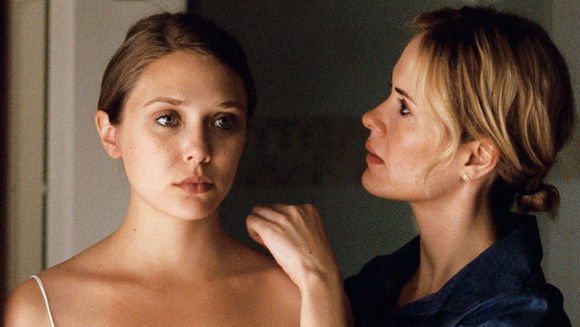Why you can trust 12DOVE
There are few things more unsettling than a chase scene in which you sense it doesn’t matter if the quarry gets away. In the opening moments of writer/director Sean Durkin’s mesmerising feature debut, Martha (Elizabeth Olsen) makes her escape from a commune, pursued through the woods by anonymous figures, but there’s no sense of triumph in her success.
However physically far away she gets it becomes clear, through Durkin’s slippery camera and Olsen’s glazed, darting eyes, that this is not a girl who has broken free. Taken in by her affluent, married older sister Lucy (Sarah Paulson), there’s a telling early exchange in which Martha asks, “How far are we?” “From what?” comes the response.
“Yesterday.” It’s a disjointed question that suggests something is off in her view of the world, but the answer in narrative terms is that we’re never very far from yesterday. Durkin slips seamlessly between time frames – in a single cut we move from present to past, from reality to memory, from Martha to Marcy May (the commune’s name for her.)
None of these narrative tricks are done for effect, but used to illustrate our heroine’s increasingly fragmented mind. As past and present become more blurred, she slips further into her memories of what we swiftly realise wasn’t a harmless hippie commune, but a physically and psychologically abusive cult. Playing the de facto face of the commune’s evils, John Hawkes’ Patrick expands on the menace that netted him an Oscar nod in Winter’s Bone .
“I know people have abandoned you your whole life,” he tells Martha calmly, and though we learn little about her origins it’s clear he’s playing on just the right vulnerabilities. Olsen is a wonder, playing someone who’s numbed to the point of catatonia without ever lacking emotion.
She deftly conveys the warring impulses at work behind Martha’s placid surface – for all she’s suffered, there’s a part of her that’s drawn irresistibly back to the place where she felt part of something.
Her inability to let go of Marcy May, coupled with her mounting paranoia (which culminates during a chilling yuppie party) creates a lingering dread that carries us right up to the disquietingly ambiguous final shot.
For all that this is an “escape from a cult” movie, there’s really been no escape at all.
Emma Didbin is a writer and journalist who has contributed to 12DOVE, The New York Times, Elle, Esquire, The Hollywood Reporter, Vulture, and more. Emma can currently be found in Los Angeles where she is pursuing a career in TV writing. Emma has also penned two novels, and somehow finds the time to write scripts for Parcast – the Spotify-owned network that creates thrilling true crime and mystery podcasts.

Metaphor: ReFantazio wanted to fix the JRPG grinding problem, but Atlus went too far at one point and accidentally broke the whole combat system

Final Fantasy 7 Remake and Rebirth battle director says combining everything he learned on Monster Hunter: World with Square Enix's technology and unique skills created a "chemical reaction"

"Minutes after Palworld released," Pocketpair was already getting game pitches from "some really big names" before it even set up its own publisher: "No one has money at the moment"












